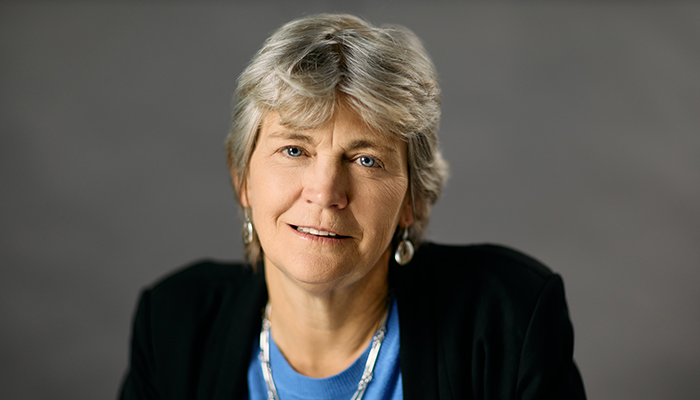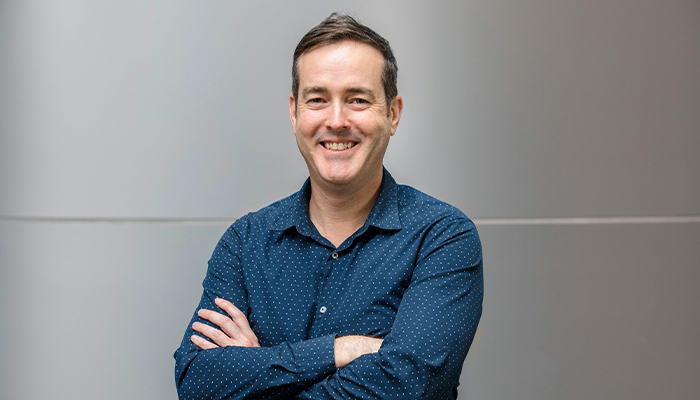Genomics is a rapidly evolving field. Discoveries made by researchers now have the potential to change healthcare in the future. We asked five leading IMB genomics researchers what advances they are most excited about in the next 5 to 10 years, and the implications for healthcare.
Professor Naomi Wray
Personalised medicine for depression
We are on the cusp of a new era where personalised medicine will be reality, even in psychiatry, which I’m excited about.
We are starting to link genetic variation in people to variation in their cell-based phenotypes – their traits and their clinical data.
Cell models that enable us to make this link are becoming cheaper and more scalable, allowing us to accelerate our investigations into which genetic variants influence traits.
These models include induced pluripotent stem cells – skin or blood cells that are reprogrammed back into stem cells that can be stimulated to develop into other cell types of the body – and organoids – cells growing in the lab in 3D structures.
To take advantage of our growing understanding of how genetic variation plays a role in disease, we are launching the Australian Genetics of Depression Cell-omics Study to create a new resource internationally for depression.
Our ultimate goal is that when someone presents with clinical symptoms, they will have a blood test leading to a diagnosis with an accompanying treatment, for example, “a psychiatric disorder responding to SSRIs (selective serotonin reuptake inhibitors)” could be inferred from cell-based phenotypes. These approaches will also lead to ideas for prevention – a word that is under-used in psychiatry research.

Professor David Evans
Using ‘mega-studies’ to identify new treatments
Due to recent advances in genotyping technology, the cost of sequencing an individual’s genome has plunged from literally over a billion dollars in the early 1990s, to well under a thousand dollars today. It is now financially possible to sequence the DNA of millions of individuals contained within large-scale biobanks across the world.
Many of these biobanks also contain information on patients’ health through linked clinical records and extensive deep phenotyping information, which record an individual’s physical traits. There are currently efforts underway to combine this information across multiple biobanks in genetic mega-studies.
Genomics researchers could mine these data to identify genes that cause disease, create algorithms to determine an individual’s risk of disease in the future, and use this information to identify targets for future drug therapies.

Professor Grant Montgomery
Targeted treatments for endometriosis
Spectacular advances in genomics and computing have greatly increased our understanding of disease in individuals and different groups from population-scale datasets down to single cell differences in space and time.
While challenges remain with the integration and management of very large datasets of detailed individual data, there are exciting practical applications that challenge healthcare to provide more personalised medicine. Examples include better individual treatments, greater recognition of disease subtypes and better targeting of drugs and drug doses to reduce variability in treatment responses.
In our endometriosis research, we are combining clinical data with genetic risk factors to shorten the long delay in diagnosis and reduce the need for unnecessary surgery. We also employ high-throughput genetics and genomics screens in organoids of individual patients to identify molecular markers for subtypes of endometriosis, discover new drug targets, and help predict and prevent recurrence after treatments.|

Dr Quan Nguyen
Treating cancer one cell at a time
Cancer originates from one aberrant cell that can expand locally in the surrounding tissue, and might eventually spread to other organs and reach an incurable metastatic state. For more than 150 years, cancer has been observed under a microscope by trained pathologists, recognising the aberrant appearance of cells to provide essential information for diagnosis and treatment. However, they cannot see the molecular profiles of the genes and proteins underlying the disease, which provide another layer of information.
My lab combines the techniques of single cell sequencing and spatial technology to study cancer in more detail than ever before. Single cell sequencing allows us to understand genetic codes at the resolution of a single cell, the building block of the human body. Spatial technologies measure molecular profiles within a tissue whilst preserving the location of cells and their neighbours, adding thousands of layers of molecular information to traditional methods.
Using these techniques, my lab can study cancer one cell at a time and across all cells within tissue across multiple time points. We aim to find new gene and cell biomarkers for early and accurate diagnosis. Controlling the spread of cancer cells is often not precise because drugs affect multiple cell types, including healthy cells. Our research will find new targets that drugs can interfere with precisely and effectively so cancer can be cured with a higher chance of success and a lower risk of side effects.
Overall, we hope our genomics work on single-cell and spatial analyses of cancer patient cells and tissues will contribute to curing cancer in the future.

Dr Sonia Shah
Moving away from ‘one size fits all’ to precision medicine
Our genetic makeup determines how likely we are to develop disease, how severe our symptoms may be – for example, some people with COVID-19 had very few symptoms, while others got long-COVID or developed heart failure. Our genetics also affects how we respond to medication and whether we are likely to have an adverse reaction.
Moving away from a ‘one-size-fits-all’ approach to healthcare, we are now rapidly advancing towards the exciting era of ‘precision medicine’, where our genetic data could be used by doctors to provide healthcare that is tailored to our genetic makeup. Countries like the United Kingdom, Finland and Singapore are already ahead in this race.
Integrating our genetic information in healthcare has the potential to reduce the burden of disease, improve disease diagnosis, improve treatments, reduce serious adverse reactions to medication and ultimately lead to major improvements to healthcare. But we need to ensure these benefits are felt equitably by all populations.
As we move towards precision medicine, we urgently need to address the lack of diversity of participants in genetic studies, 85 per cent of whom are currently of European ancestry. Findings from one population do not always translate well into other populations. We have launched the South Asian Genes and Health Study to encourage more samples from Australians of South Asian descent, and provide a framework for more inclusive genomics research in Australia.


